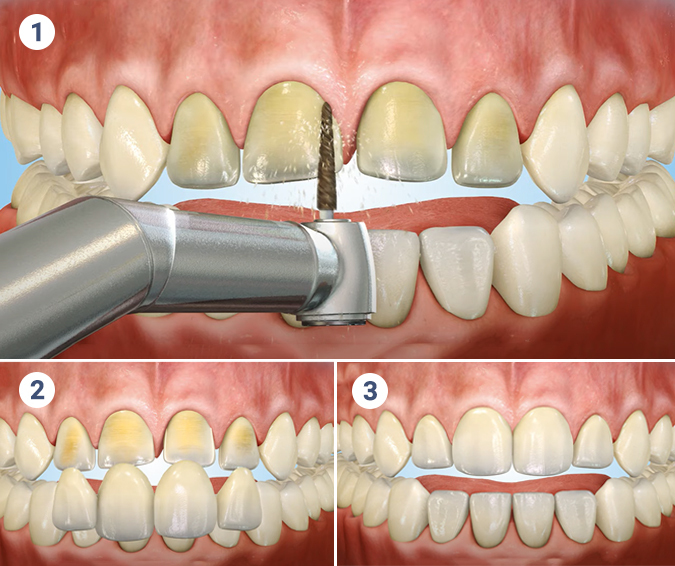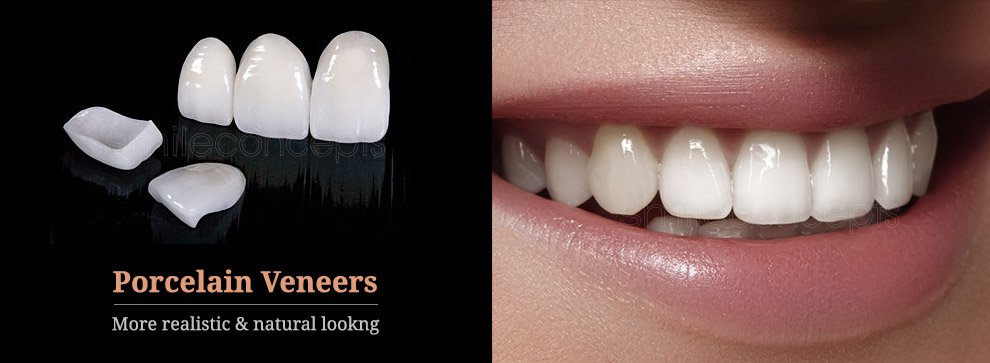Porcelain Veneers Dentist Tips for Achieving a Natural Look
Wiki Article
The Complete Overview of Veneers: Kinds, Uses, and Their Influence on Your Smile
Veneers function as a prominent service for people seeking to enhance their oral looks. These custom-crafted coverings can effectively mask blemishes such as discoloration and spaces. With 2 main kinds available, porcelain and composite material, each deals unique advantages and restrictions. The effect of veneers expands past mere appearance, affecting self-confidence and social interactions. Understanding their types and benefits is crucial. What might this indicate for one's overall top quality of life?Understanding Veneers: What They Are and How They Function
Veneers are slim coverings, generally made from porcelain or composite resin, that are custom-crafted to fit over the front surface area of teeth. They offer both aesthetic and useful purposes, supplying an option for various dental blemishes such as staining, voids, and minor misalignments. By adhering to the tooth enamel, veneers produce an all-natural appearance while boosting the form and color of the teeth.The procedure generally entails an initial assessment, where a dental practitioner analyzes the patient's needs and reviews preferred results - Porcelain Veneers Dentist. Following this, a marginal quantity of enamel might be gotten rid of to suit the veneer. Perceptions of the teeth are after that required to assure a specific fit. Once produced, the veneers are bound safely to the teeth making use of an unique dental adhesive. This treatment not just boosts the smile's look but additionally helps protect the underlying teeth from more damages, making veneers a preferred option for numerous looking for a smile remodeling
Kinds of Veneers: Porcelain vs. Composite Resin
The difference between porcelain and composite material veneers exists in their product make-up and features. Each type offers varying levels of longevity, long life, and cost, influencing clients' options based on their private requirements. Recognizing these distinctions is important for making an informed decision pertaining to oral enhancements.Material Distinctions Clarified
While both porcelain and composite resin veneers serve the same cosmetic function, they vary considerably in material buildings, resilience, and visual end results. Porcelain veneers are crafted from a ceramic product that resembles the natural transparency of teeth, offering a natural appearance. Their smooth surface area is resistant to discoloration, making them an appealing option for those looking for a long-lasting visual. On the other hand, composite material veneers are made from a tooth-colored plastic product, supplying convenience and convenience of application. Nonetheless, they might not accomplish the same level of illumination or clarity as porcelain. Additionally, composite veneers can be more easily formed and fixed, making them a more flexible alternative in specific dental scenarios. Each kind provides distinct advantages customized to individual choices.Durability and Toughness
Durability and resilience are substantial aspects when comparing porcelain and composite material veneers. Porcelain veneers are known for their toughness, typically lasting 10 to 15 years with correct care. Their strength against discoloring and chipping makes them a popular option for individuals looking for long-term outcomes. On the other hand, composite material veneers commonly have a shorter lifespan, balancing 5 to 7 years. While they can be fixed more conveniently if damaged, they are a lot more susceptible to put on and staining gradually. The selection in between these materials commonly depends on the person's way of living, visual objectives, and maintenance choices. Eventually, understanding the differences in long life and resilience can assist patients in selecting the veneer type that finest matches their demands.Cost Comparison Insights
Expense is a critical consideration when choosing between porcelain and composite resin veneers. Porcelain veneers generally range from $800 to $2,500 per tooth, showing their toughness, visual allure, and resistance to discoloration. These veneers call for an extra extensive procedure and specialized laboratory job, adding to their greater price. On the other hand, composite material veneers are normally a lot more inexpensive, costing in between $250 and $1,500 per tooth. They can be used in a solitary see, which reduces labor costs. However, composite veneers might require a lot more constant substitutes, possibly enhancing long-lasting costs. Eventually, the choice in between porcelain and composite material veneers depends upon individual budgets and desired outcomes, stabilizing first prices versus durability and aesthetic results.The Advantages of Deciding On Veneers for Your Smile
Selecting veneers offers considerable benefits for those looking for an improved smile. Their enhanced visual appeal can change the appearance of teeth, while their stain-resistant properties assure a long lasting illumination - What Are Veneers. This mix makes veneers a popular alternative for individuals seeking to achieve a perfect smileBoosted Aesthetic Allure
Veneers usually emerge as a popular solution due to their transformative aesthetic advantages when people seek to boost their smiles. These slim shells, usually constructed from porcelain or composite resin, can successfully hide imperfections such as chips, spaces, and imbalance. By mimicking the natural appearance of teeth, veneers give a smooth, radiant smile. Their adjustable nature permits a tailored method, making it possible for people to pick shades and shapes that best suit their facial functions. Furthermore, veneers can develop a consistent look, boosting overall facial symmetry. This aesthetic enhancement not only enhances self-confidence but can likewise positively influence personal relationships and social interactions, making veneers a popular choice for those wanting to achieve a brighter, more attractive smile.Stain Resistance Benefits
Veneers not just boost visual charm but also offer substantial tarnish resistance, making them an eye-catching choice for individuals concerned concerning keeping a brilliant smile. Composed of durable products such as porcelain or composite material, veneers are less permeable than all-natural teeth, which assists avoid the absorption of discolorations from usual perpetrators like coffee, tea, and merlot. This inherent tarnish resistance enables individuals to appreciate their preferred drinks without bothering with staining. What Are Veneers. Additionally, the smooth surface area of veneers makes them easier to tidy, additional enhancing their long life and preserving their beautiful look. As a result, veneers provide a sensible option for those looking for both charm and functionality in their dental treatmentThe Process of Obtaining Veneers: What to Expect

Although the procedure of getting veneers might seem daunting, understanding the actions involved can ease issues. At first, a consultation with a dental expert is necessary to identify if veneers are the proper solution for the individual's dental concerns. Throughout this appointment, the dental expert will certainly go over wanted outcomes and take impressions of the teeth.
Next off, a 2nd visit is arranged for tooth prep work, where a tiny quantity of enamel is typically removed to fit the veneers. Temporary veneers may be placed while the customized ones are crafted in a dental lab, which typically takes a couple of weeks.
When ready, the dental professional will put the veneers, guaranteeing appropriate fit and color before bonding them to the teeth using an unique adhesive. After last changes, the dental practitioner will provide guidance on care. Understanding these actions can aid patients feel extra comfy and notified throughout the veneer process.
Upkeep and Look After Your Veneers
Preserving veneers requires consistent like guarantee their long life and look. Appropriate oral health is crucial; cleaning twice daily with a non-abrasive tooth paste and flossing frequently aid prevent plaque buildup around the veneers. In addition, routine oral examinations are vital for checking the condition of the veneers and addressing any type of potential concerns at an early stage.Patients must avoid difficult foods and too much force when attacking to stop damages. It's likewise advisable to limit usage of staining compounds, such as coffee, tea, and red a glass of wine, as these can affect the veneers' shade with time.

Changing Your Smile: Real-Life Influence of Veneers
A radiant smile can significantly improve one's self-confidence and total look. For many individuals, veneers act as a transformative option, properly addressing various dental worries such as staining, voids, and imbalance. These slim coverings, custom-made to fit over the front of the teeth, can create an unified and cosmetically pleasing smile.Real-life instances highlight the extensive influence veneers can have. Individuals commonly What Are Veneers report a prompt increase in self-confidence and social interactions following their procedure. The newly found self-confidence can cause even more chances in specialist and individual life, as individuals feel even more likely to involve and reveal themselves.
Furthermore, the psychological advantages expand past simple appearance; several experience boosted psychological well-being as they embrace their smiles. Subsequently, veneers not just improve physical characteristics but additionally contribute significantly to overall lifestyle, underscoring their worth in aesthetic dentistry.
Frequently Asked Inquiries
For How Long Do Veneers Commonly Last Before Requiring Substitute?
Veneers usually last between 10 to 15 years prior to needing replacement. Aspects such as oral health, dental behaviors, and the sort of material utilized can influence their long life and overall longevity. Routine oral examinations are advisable.Can Veneers Be Eliminated, and if So, How?
Yes, veneers can be gotten rid of. A dental professional typically utilizes customized tools to very carefully separate them from the teeth, guaranteeing marginal damage to the underlying enamel, commonly adhered to by required modifications or remediations for ideal aesthetics.Are Veneers Suitable for Everybody's Oral Condition?

Will Obtaining Veneers Hurt or Require Anesthetic?
Getting veneers normally involves very little pain, and lots of patients get local anesthesia to assure a pain-free experience. Sensitivity might occur briefly later, however the majority of find the procedure bearable and are satisfied with the outcomes.Just How Do Veneers Affect Tooth Sensitivity After Positioning?
Veneers can temporarily enhance tooth level of sensitivity due to the removal of enamel and the bonding procedure. Most individuals experience a decline in sensitivity in time as the teeth adapt to the new veneers.Veneers are thin coverings, typically made from porcelain or composite resin, that are custom-crafted to fit over the front surface area of teeth. Porcelain veneers are crafted from a ceramic product that mimics the natural transparency of teeth, giving a lifelike appearance. Porcelain veneers normally vary from $800 to $2,500 per tooth, reflecting their sturdiness, visual allure, and resistance to discoloration. In contrast, composite resin veneers are typically a lot more inexpensive, costing between $250 and $1,500 per tooth. Made up of long lasting products such as porcelain or composite material, veneers are less porous than natural teeth, which assists stop the absorption of discolorations from usual culprits like coffee, tea, and red wine.
Report this wiki page